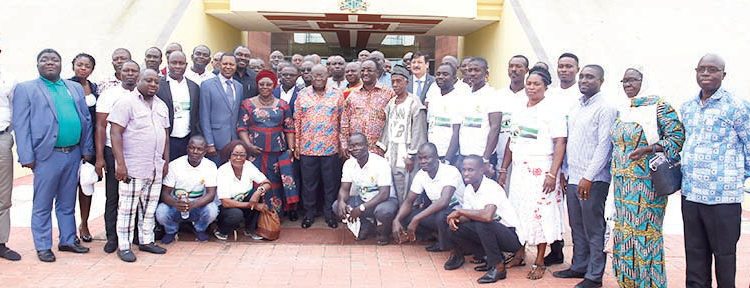President Akufo-Addo with members of the Oil Palm Development
Association of Ghana at the Jubilee House
Producers of palm oil are pushing for a review of the policy that allows the importation of the product into the country.
A recent announcement by government reduced import levy on palm oil by 50 per cent, but the Oil Palm Development Association of Ghana (OPDAG) says the reduction is having a toll on their businesses, for which reason it wants the levy to be increased to save the local market.
Speaking at a meeting with President Akufo-Addo at the Jubilee House last Tuesday, president of the association, Samuel Avaala, indicated that the impact of the new import tariff policy was adversely affecting the local palm oil industry.
“The local refineries and manufacturing industries are no longer viable to operate; the refineries are unable to sell their products competitively against imported vegetable oil which has become cheaper as a result of the above policy which in essence has subsidized the imports,” he pointed out.
“The cost of a 25-litre vegetable oil produced locally is sold on the market for GH¢140 inclusive of the duty, levies, VAT and logistics. But the imported vegetable oil products are sold on the market at the price of GH¢113,” he added.
Prior to the passing of the 50 per cent benchmark policy, the association, together with the Ministry of Food & Agriculture and the Customs Division of Ghana Revenue Authority, was fighting the practice of undeclared vegetable oil imports.
“This policy has legitimized under invoicing, hence the flooding of our markets with cheaper and substandard vegetable oils. The phenomenon of under-declaring and under-invoicing is costing about three million dollars (US$ 3,000,000) revenue loss to the state per month,” he revealed.
As a result, the association wants government to consider exempting vegetable oil (palm oil) from the 50 per cent reduction on the import benchmark value.
It also wants the importation of vegetable oil to be restricted to the Tema and Takoradi ports of entry and none other in order to control smuggling as it has been done for the textiles industry.
In his response, President Akufo-Addo noted that a country like Malaysia picked the oil palm business from Ghana and has developed it into a $16-billion dollar industry per year. He said that is facing serious challenges at the attempts to develop the sector.
“The issues that you have brought here are very important issues for us in Ghana and they are matters which we have to address. I want you to have a clear understanding that the overall posturing of my government is to be very sympathetic to your development. I think it will make a lot of sense for Ghana if we could find a consensus and a meeting of minds on how to address the challenges that are bothering you, because ultimately we will be the big gainers of it,” he told members of the association.
By Charles Takyi-Boadu, Presidential Correspondent


